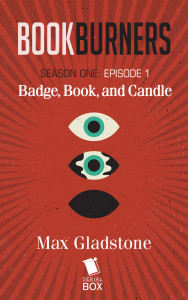Fifty pages aren't many.That's plenty of room to tell a straightforward story—but a pilot episode isn't straightforward. You face competing goals: on the one hand, you have to tell a complete tale that gets people excited, because if you don't, readers won't come back. On the other hand, you have to set up long-term tension, to make readers feel the story has somewhere to go! Characters and plot have to resolve and open at once.

Also contradictory: the economics of form. The short story is one of the least forgiving forms, to my mind. Novels have space for flourish and ornament; in short fiction, every word and character and scene bears load. At the same time, short fiction's expected to present individuals developing through a dramatic situation over time (for the most part), which is a demand poetry doesn't generally face. But a pilot also needs to build world and characters for the future—so you're bound by the everything-matters economics of short fiction, but you have to build a much larger dramatic structure. It's like trying to build a tiny house in which every beam is load-bearing for a skyscraper.Which is to say, fun!Writing this episode, I thought a lot about my favorite pilots—especially the first episode of Leverage, which in my opinion balances short and long con brilliantly. We meet the team in three different ways; their conflicts are local to the episode, but also instances of larger structural issues among the characters and setting. I tried to bring some of that to the story—while keeping the prose light enough people readers aren't overcome with information.Also, I used a lot of notecards and permanent markers. I usually write improvisationally, but in a situation where every scene—every word—counts, and most have to fill two purposes at once, I had to be able to consider and reject many possible story beats quickly, to find the best one that filled my needs. So, to the corkboard! There are plenty of software tools for this sort of thing, but I found the physicality of the corkboard—laying out notecards, condensing concepts to pithy sentences, pinning them in place, seeing what sort of structure emerged—very helpful. It seemed more concrete and more flexible at once: more concrete since the words were actually out there in the real world, where I could see them, and more flexible since I could do whatever I wanted with these note cards. Cross them out! Annotate them. Tear them up. Replace them. Pin them out of sequence. Shuffle them, if necessary.I picked up the habit from Margaret at our first writer's retreat, and it's stuck. Don't tell the pantser police—they'll make me turn in my membership card.





